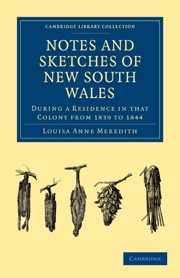Summary
We were now fairly “at sea,” with no chance of any pleasant variety of scene, as, unluckily for us, our “good ship Argo” was to make a direct passage to Sydney, without touching at any intermediate port. Like true philosophers, we consoled ourselves by the reflection that, as some compensation for the disappointment, our voyage would be the more speedy from having no interruption; though to sail half round the world, and be near so many interesting and beautiful spots, of which I had heard and read so much, and not to see even one of them—not Madeira, with its vine-clad hills—nor Teneriffe, nor even the Cape, that general “half-way house” for poor exiles like ourselves—certainly appeared rather hard, and, as I considered it, great waste of time and travelling.
The Bay of Biscay, so renowned in song and story for its stormy winds and waves, was happily in a most pacific mood when we crossed it with a fair light breeze and sunny weather; and though the fine old song was often quoted at the time, we had no disastrous consequences to remind us
“Of the day
When we lay
In the Bay of Biscay O!”
We “sighted” the Spanish and Portuguese coasts, and with glasses could discern trees and white houses or cottages; and as wishful imagination converted every green thing into an orangery or a vineyard, our distant gazes made us still more anxious for a nearer investigation of the good things we fancied there.
- Type
- Chapter
- Information
- Notes and Sketches of New South WalesDuring a Residence in that Colony from 1839 to 1844, pp. 7 - 15Publisher: Cambridge University PressPrint publication year: 2010First published in: 1844

